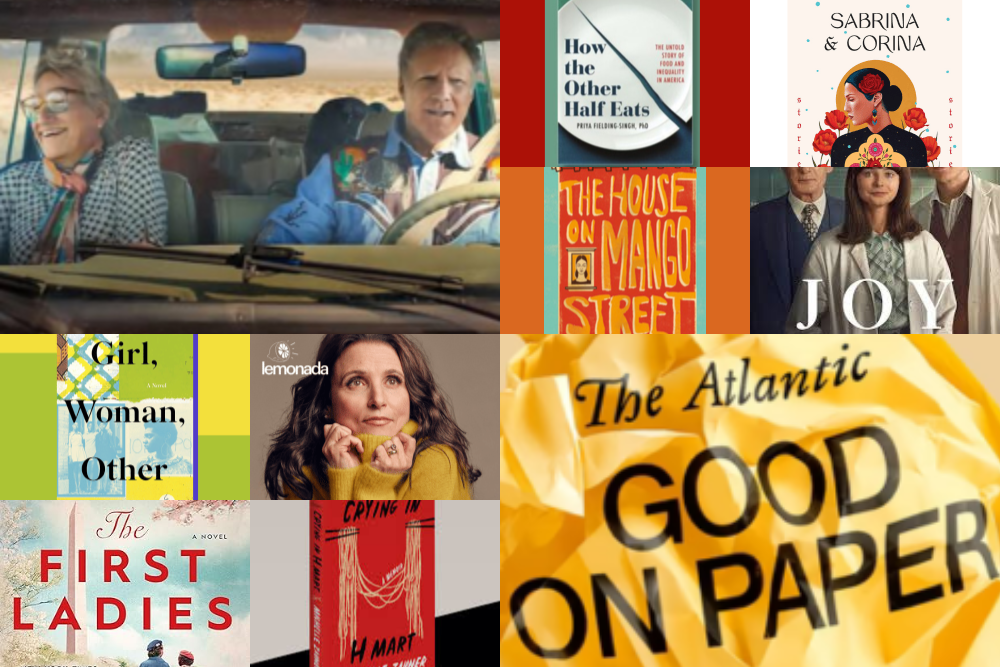
What We Read, Watched, and Listened to in 2024
Books, Documentaries, Podcasts, and More That Helped Us Grow
Members of our staff are eager to once again share what we read, watched, and listened to in 2024 that contributed to our learning and growth. Some of our selections are classic novels while some are among the most-watched Netflix shows. But what they all have in common is that they have sparked conversations and consideration of new viewpoints that illuminate our paths to gender, racial, and economic equity. As always, we hope they pique your interest and you’ll check them out!
How The Other Half Eats – A Book by Priya Fielding-Singh, PhD
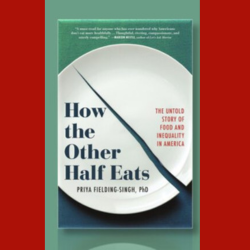
This “untold story of food and inequality in America” preceded the steep hikes in groceries we’ve experienced since 2021. However, if anything, inflation makes the author’s findings even more relevant today. Fielding-Singh followed four families – a Black family living below the federal poverty line; a working-class white family; a middle-class Latino family; and an affluent white family. Despite their enormous differences in resources, all the moms cared deeply about their kids’ health. But because some families had to parent from a place of scarcity while others had the luxury of parenting from abundance, food’s meaning is very different to each of them. The book helped me understand how those differences influence the food choices they make for their families with what the author calls “radical empathy.” When we accept the limits of our own understanding and experience, it makes sense why the mom who uses SNAP benefits also chooses to buy her daughter a Frappuccino rather than save for a new air-conditioning unit. Because it gives her a rare chance to say “yes” as a parent. It makes sense why the most privileged moms who don’t have to worry about their kids’ safety, shelter, or satiety are the most worried about getting their kids’ diets’ “right.” They often “upscale” their worries into bigger issues because they have time and energy to do so. There are layers of class insights in this book and examples of how we assign values to certain foods to judge who or who isn’t a good mother.
– Lisa Christie, Vice president of communications
Will & Harper – A Documentary on Netflix
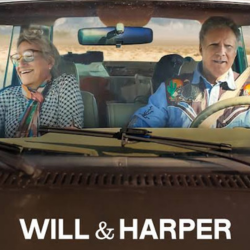 At under two hours, this is a documentary worth your time and emotional investment. It follows one of my favorite actors, Will Ferrell, and his friend, former “Saturday Night Live” writer Harper Steele, on a road trip across America. Harper recently came out as a trans woman and Will is not only getting to know his old friend through this new lens but is getting a drivers-seat view of what it’s like to be transgender in America. From greasy spoon diners to NBA games to Oklahoma dive bars, at times it seems Harper is only shielded by Ferrell’s celebrity status. Other times people are politely curious.
At under two hours, this is a documentary worth your time and emotional investment. It follows one of my favorite actors, Will Ferrell, and his friend, former “Saturday Night Live” writer Harper Steele, on a road trip across America. Harper recently came out as a trans woman and Will is not only getting to know his old friend through this new lens but is getting a drivers-seat view of what it’s like to be transgender in America. From greasy spoon diners to NBA games to Oklahoma dive bars, at times it seems Harper is only shielded by Ferrell’s celebrity status. Other times people are politely curious.
In addition to the dialogue between Will & Harper, the scene that truly stole my heart was when they drop by a secret house Harper bought in the desert before she transitioned. It was, she described to Will, “my own space to dress like a woman, walk around like a woman. Miles from anyone.”
You’ll smile, laugh, cry, and remember this one for quite a while.
– Lisa Christie, vice president of communications
The House on Mango Street – A Book by Sandra Cisneros
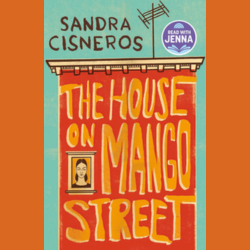 Our work at The Women’s Foundation of Colorado is focused on advancing gender, racial, and economic equity. Why? So that every woman has the freedom and resources to make her own decisions about her life and future. These themes are explored and expressed powerfully in Sandra Cisneros’ 1984 novel “The House on Mango Street.” This modern coming-of-age classic is a collection of vignettes, each a thread in a vibrant tapestry that illustrates the complexities of adolescence, sexuality, gender-based violence, immigration, identity, language, and economic (in)dependence.
Our work at The Women’s Foundation of Colorado is focused on advancing gender, racial, and economic equity. Why? So that every woman has the freedom and resources to make her own decisions about her life and future. These themes are explored and expressed powerfully in Sandra Cisneros’ 1984 novel “The House on Mango Street.” This modern coming-of-age classic is a collection of vignettes, each a thread in a vibrant tapestry that illustrates the complexities of adolescence, sexuality, gender-based violence, immigration, identity, language, and economic (in)dependence.
Cisneros dedicated the book “A las Mujeres, To the Women” and it is an inspiring gift. Narrated by Esperanza Cordero, “The House on Mango Street” is one young woman’s hope for her own future, shaped by all the women in her family and community. The stories shape the hopes all readers hold for their own futures and those of the girls and women they love. I can’t wait to read it with my daughters!
– Louise Myrland, vice president of programs
Wiser Than Me – A Podcast With Julia Louis-Dreyfus
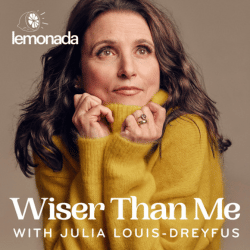
As a fan of Julia Louis-Dreyfus and a seeker of interesting podcasts I can learn something new from, I started listening to “Wiser Than Me,” a podcast where Julia interviews older, accomplished women who have lived full lives and gained valuable wisdom along the way. Each episode features a woman who has made a mark in her field (and there are many fields represented!), offering listeners insights into life, aging, and personal growth through humor and grace.
My favorite episode thus far is when “Julia Gets Wise with Dolores Huerta.” Dolores Huerta is a 94-year-old labor activist who originally and iconically created the phrase and rally cry, “Sí Se Puede” (“Yes We Can”). Dolores shared about her time as a woman activist in a labor movement that was largely dominated by men and shed light on personal beliefs that changed over time, including her evolution from anti-choice to pro-choice values within the context of her own Catholic beliefs. Dolores Huerta is one of my personal “sheroes,” and as I listened to this episode, I am reminded that there is much to learn from older generations. I hope this episode and podcast invites you to listen more deeply and with great care to populations that are largely overlooked, especially at the intersections of age, race, ethnicity, and gender. I know I feel the spark to do so.
– Crystal Ayala-Goldstein, programs manager
Sabrina & Corina – A Book by Kali Fajardo-Anstine
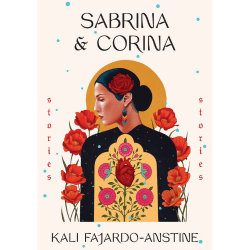
“Sabrina & Corina” touches my heart with its masterful weaving of Indigenous Latina women’s stories. As I turned each page, I could see my own family’s story come alive through these Denver neighborhoods. My aunt’s knowing glance, my cousin’s determined spirit, my mother’s strength, and my grandmother’s gentle heart looked back at me from these pages. Their love, quiet struggles, grief, and journey of self-discovery were explored through her characters. Fajardo-Anstine describes accounts of strong women – mothers, daughters, and sisters – across generations who honor their cultural history while forging their own paths forward. These stories honor the depth of family relationships and cultural traditions rooted in Latin families. What an incredible blessing it is to see our experiences celebrated and represented on the printed page. Thank you, Kali!
– Renee Ferrufino, vice president of development
Girl, Woman, Other – A Book by Bernardine Evaristo
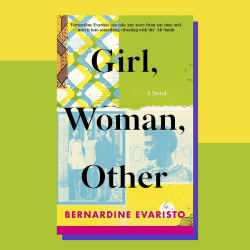
I am unabashed about my appetite for beautiful language, quirky punctuation, and well-developed diverse characters wrestling with the complexities of life. “Girl, Woman, Other” by Bernardine Evaristo, the 2019 winner of the Booker Prize and a New Yorker Best Books of the Year satiated that appetite. It has been called a tour de force. Flowing through unconventional prose and 12 eclectic intersectional and interconnecting humans was the perfect literary buffet. The reader moves seamlessly through effervescent lives of an unforgettable group of Black Brits. We become enthralled with a playwright, school teacher and social influencer to name a few, who are expansive in their gender identities, expressions, loves, hurts, wisdom, and self-discoveries. For some, it becomes a space of gaining community and for others loss of everything they’d known. By the end of the book, I felt I truly knew these Girl Woman Other. We had laughed, cried, learned and lived together at a fast but meaningful pace. I miss these new voices who are too often muted. But the true beauty of a gorgeous book is that I can start over again.
There is one quote that intrigues me, “America will make you expand into its expansiveness, Ams, you’ll become louder, bolder, more intellectually and creatively stimulated, you’ll reach new heights, for sure, I know it has more than it’s fair share of social and political ills…” Me: Let’s hope that’s true.
– Lauren Y. Casteel, president and CEO
Crying in H Mart – A Book by Michelle Zauner
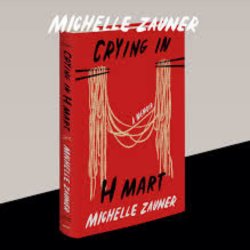
There’s a moment in “Crying in H Mart” where Michelle Zauner describes watching her mother prepare kimchi, memorizing each step knowing someday she’d need to recreate it herself. As a mother, I often feel the weight of what I’m passing down to my daughter – the recipes and rituals, the stories, the tools and skills, and the world she will inherit.
Zauner’s writing about her mother’s illness and death is moving, but it’s her descriptions of food that linger – both the making and sharing of it. The way she captures Korean cooking, childhood memories of her mother preparing traditional dishes, and her own attempts to recreate those recipes creates an intimate portrait of both love and loss. There’s a vulnerability in how she writes about finding herself caught between cultures, trying to hold onto her Korean heritage while forging her own path.
Like all great memoirs, “Crying in H Mart” stays with you long after you finish the last page. It’s a reminder of how food can tell our stories, carry our memories, and sometimes even help us heal.
– Maggie Stoot, director of development
The Guarantee: Inside the Fight for America’s Next Economy – A Book by Natalie Foster
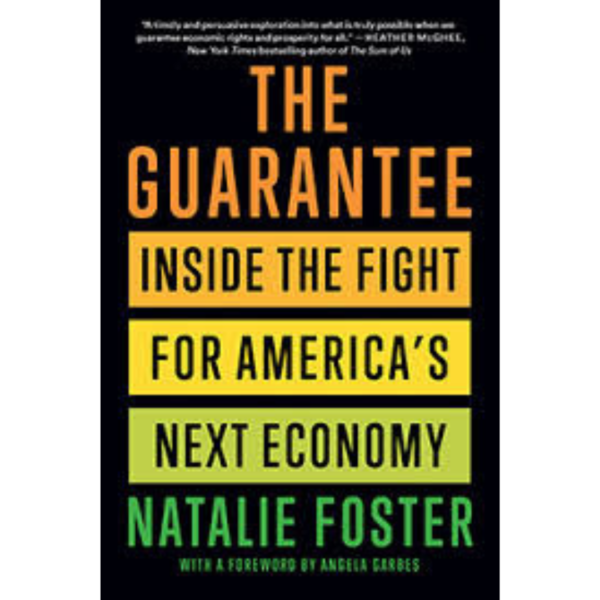
I think we can all agree in one way or another that our current system is not working for all us. There’s never been a larger gap between the richest and the poorest. Many of us are concerned about our children’s economic futures. Our country does not have to go forward in the same manner that is has for decades – there are realistic policy solutions that can improve the well-being and future prospects of our fellow Coloradans. At WFCO we see these glimmers through our WINcome and Women & Girls of Color Fund grantmaking, investing and trusting in women can improve prosperity. The Guarantee by Natalie Foster details how guaranteeing housing, healthcare, education, and dignified work can improve opportunity so all women and girls can thrive in a more fair society.
– Alison Friedman Phillips, director of programs, policy, & advocacy
The First Ladies – A Book by Marie Benedict and Victoria Christopher Murray

This novel highlights the incredible partnership between First Lady Eleanor Roosevelt and civil rights icon Mary McLeod Bethune—an inspiring friendship that changed history. It was a chance for me to learn about the extraordinary Mary Bethune, known as The First Lady of the Struggle, whose work as an educator and activist broke barriers despite relentless racism.
Through their bond, Eleanor not only became a stronger advocate for civil rights but also confronted her own assumptions and white privilege, guided by Mary’s wisdom and courage. Together, they built a powerful alliance that helped lay the groundwork for the modern civil rights movement.
The coauthors of this book also have a wonderful story of their own friendship and collaboration.
– Jen Schwem, database administrator
Joy: The Birth of IVF – A Film on Netflix
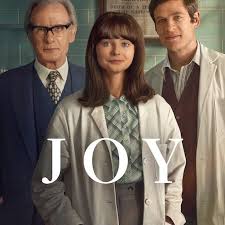
What struck me most about “Joy: The Birth of IVF” on Netflix was its powerful message about reproductive choice. There’s this incredible scene where Sister Muriel, the matron of their lab, has to remind Jean Purdy that their work is fundamentally about giving women options – whether that means having babies or not having them after Jean objects to abortions also being performed in the lab. In today’s climate where reproductive rights are under attack, it was fascinating to watch a historical drama that shows how the fight for women’s bodily autonomy – and yes, IVF is fundamentally at its core a woman’s reproductive choice – has deep roots. The fact that Jean persevered with this controversial work even when her own church community and mother turned their backs on her makes this story even more powerful.
And speaking of Jean – what an eye-opener to learn about this woman whose crucial role in developing IVF was swept under the rug for decades. The film shows how the entire lab actually had to shut down for a time when she left to care for her sick mother – that’s how essential she was! But as usual in history, her male colleagues got all the credit, including a solo Nobel Prize years later. It’s a stark reminder of all the other women whose contributions have been erased from scientific history. Through Jean’s story, we see a pattern that’s sadly all too familiar: groundbreaking women whose work shaped our world, only to be forgotten while men received the glory.
– Erica Jackson, digital marketing manager

